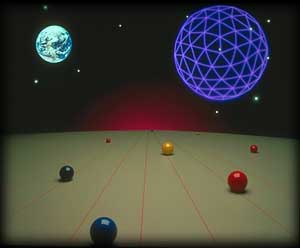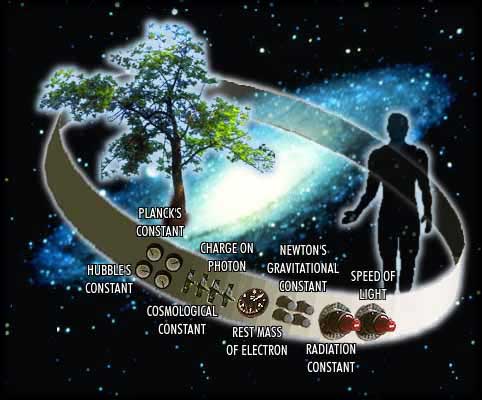
ACCORDING TO GROWING NUMBERS OF SCIENTISTS, the laws and constants of nature are so "finely-tuned," and so many "coincidences" have occurred to allow for the possibility of life, the universe must have come into existence through intentional planning and intelligence. In fact, this "fine-tuning" is so pronounced, and the "coincidences" are so numerous, many scientists have come to espouse "The Anthropic Principle," which contends that the universe was brought into existence intentionally for the sake of producing mankind. Even those who do not accept The Anthropic Principle admit to the "fine-tuning" and conclude that the universe is "too contrived" to be a chance event.
many scientists have
come to espouse
"The Anthropic Principle,"
which
contends that
the universe was
brought into
existence
intentionally for the sake
of producing
mankind
In a BBC science documentary, "The Anthropic Principle," some of the greatest scientific minds of our day describe the recent findings which compel this conclusion.
Dr. Dennis Scania, the distinguished head of Cambridge University Observatories: "If you change a little bit the laws of nature, or you change a little bit the constants of nature -- like the charge on the electron -- then the way the universe develops is so changed, it is very likely that intelligent life would not have been able to develop."
Dr. David D. Deutsch, Institute of Mathematics, Oxford University: "If we nudge one of these constants just a few percent in one direction, stars burn out within a million years of their formation, and there is no time for evolution. If we nudge it a few percent in the other direction, then no elements heavier than helium form. No carbon, no life. Not even any chemistry. No complexity at all."

as a chance happening,
the fact remains that
the universe seems
unreasonably suited to
the existence of life --
almost contrived --
you might say a
"put-up job."
Dr. Paul Davies, noted author and professor of theoretical physics at Adelaide University: "The really amazing thing is not that life on Earth is balanced on a knife-edge, but that the entire universe is balanced on a knife-edge, and would be total chaos if any of the natural 'constants' were off even slightly. You see," Davies adds, "even if you dismiss man as a chance happening, the fact remains that the universe seems unreasonably suited to the existence of life -- almost contrived -- you might say a 'put-up job.'"
According to the latest scientific thinking, the matter of the universe originated in a huge explosion of energy called "The Big Bang." At first, the universe was only hydrogen and helium, which congealed into stars. Subsequently, all the other elements were manufactured inside the stars. The four most abundant elements in the universe are, in order, hydrogen, helium, oxygen and carbon. When Sir Fred Hoyle was researching how carbon came to be, in the "blast-furnaces" of the stars, his calculations indicated that it is very difficult to explain how the stars generated the necessary quantity of carbon upon which life on earth depends. Hoyle found that there were numerous "fortunate" one-time occurrences which seemed to indicate that puposeful "adjustments" had been made in the laws of physics and chemistry in order to produce the necessary carbon.
Hoyle sums up his findings as follows:
"A COMMON SENSE INTERPRETATION OF THE FACTS SUGGESTS THAT A SUPERINTENDENT HAS MONKEYED WITH THE PHYSICS, AS WELL AS CHEMISTRY AND BIOLOGY, AND THAT THERE ARE NO BLIND FORCES WORTH SPEAKING ABOUT IN NATURE. I DO NOT BELIEVE THAT ANY PHYSICIST WHO EXAMINED THE EVIDENCE COULD FAIL TO DRAW THE INFERENCE THAT THE LAWS OF NUCLEAR PHYSICS HAVE BEEN DELIBERATELY DESIGNED WITH REGARD TO THE CONSEQUENCES THEY PRODUCE WITHIN STARS."
Adds Dr. David D. Deutch: "If anyone claims not to be surprised by the special features that the universe has, he is hiding his head in the sand. These special features ARE surprising and unlikely."
the scientific
establishment's
most prestigious
journals, and
its
most
famous
physicists
and
cosmologists, have
all
gone on record as
recognizing the objective
truth of the fine-tuning
Universal Acceptance
of
Fine-Tuning
Besides the BBC video, the scientific establishment's most prestigious journals, and its most famous physicists and cosmologists, have all gone on record as recognizing the objective truth of the fine-tuning.
The August '97 issue of "Science" (the most prestigious peer-reviewed scientific journal in the United States) featured an article entitled "Science and God: A Warming Trend?" Here is an excerpt: "The fact that the universe exhibits many features that foster organic life -- such as precisely those physical constants that result in planets and long-lived stars -- also has led some scientists to speculate that some divine influence may be present."
In his best-selling book, A Brief History of Time, Stephen Hawking (perhaps the world's most famous cosmologist) refers to the phenomenon as "remarkable." "The remarkable fact is that the values of these numbers (i.e. the constants of physics) seem to have been very finely adjusted to make possible the development of life" (p. 125).
We are thus
not the first to reformulate the argument from design on the basis
of the uniqueness of the values that we find in the constants.
It seems clear that
there are
relatively few
ranges of values for
the [constants]
that
would allow for
development of any
form of intelligent life.
Most sets of values
would give rise to
universes that,
although they might
be very
beautiful,
would contain no one
able to wonder
at that beauty.
"For example," Hawking writes, "if the electric charge of the electron had been only slightly different, stars would have been unable to burn hydrogen and helium, or else they would not have exploded... It seems clear that there are relatively few ranges of values for the numbers (for the constants) that would allow for development of any form of intelligent life. Most sets of values would give rise to universes that, although they might be very beautiful, would contain no one able to wonder at that beauty." Hawking then goes on to say that he can appreciate taking this as possible evidence of "a divine purpose in Creation and the choice of the laws of science (by God)" (ibid. p. 125).
Upon viewing our site, Dr. Gerald Schroeder, former professor of physics at M.I.T., wrote to us and had this to say. "As is, the site is excellent. Any additions I suggest here, are, as it were, merely fine-tuning. But let me give two or three more major examples":
1. Nobel laureate, high energy physicist (a field of science that deals with the very early universe), Professor Steven Weinberg, in the journal Scientific American, reflects on "how surprising it is that the laws of nature and the initial conditions of the universe should allow for the existence of beings who could observe it. Life as we know it would be impossible if any one of several physical quantities had slightly different values." Although Weinberg is a self described agnostic, he cannot but be astounded by the extent of the fine-tuning. He goes on to describe how a beryllium isotope having the minuscule half life of 0.0000000000000001 seconds must find and absorb a helium nucleus in that split of time before decaying. This occurs only because of a totally unexpected, exquisitely precise, energy match between the two nuclei. If this did not occur there would be none of the heavier elements. No carbon, no nitrogen, no life. Our universe would be composed of hydrogen and helium. But this is not the end of Professor Weinberg's wonder at our well tuned universe. He continues: "One constant does seem to require an incredible fine-tuning... The existence of life of any kind seems to require a cancellation between different contributions to the vacuum energy, accurate to about 120 decimal places."
This means that if the energies of the big bang were, in arbitrary units, not:
1000000000000000000000000
0000000000000000000000000
0000000000000000000000000
0000000000000000000000000
00000000000000000000,
but instead:
1000000000000000000000000
0000000000000000000000000
0000000000000000000000000
0000000000000000000000000
00000000000000000001,
there would be no life of any sort in the entire universe because as Weinberg states: "the universe either would go through a complete cycle of expansion and contraction before life could arise or would expand so rapidly that no galaxies or stars could form."
2. Michael Turner, the widely quoted astrophysicist at the University of Chicago and Fermilab, describes the fine-tuning of the universe with a simile: "The precision is as if one could throw a dart across the entire universe and hit a bullseye one millimeter in diameter on the other side."
as if one could
throw a dart across
the entire universe
and hit a bullseye
one millimeter [across]
on the other side.
3.
Roger Penrose, the Rouse Ball Professor of Mathematics at the
University of Oxford, discovers that the likelihood of the
universe having usable energy (low entropy) at the creation is
even more astounding, "namely, an accuracy of one part out of ten
to the power of ten to the power of 123. This is an extraordinary
figure. One could not possibly even write the number down in full,
in our ordinary denary (power of ten) notation: it would be one
followed by ten to the power of 123 successive zeros!" That is a
million billion billion billion billion billion billion billion billion
billion billion billion billion billion zeros. Penrose continues,
"Even if we were to write a zero on each separate proton and on
each separate neutron in the entire universe -- and we could throw
in all the other particles as well for good measure -- we should
fall far short of writing down the figure needed. The precision
needed to set the universe on its course is to be in no way
inferior to all that extraordinary precision that we have already
become accustomed to in the superb dynamical equations (Newton's,
Maxwell's, Einstein's) which govern the behavior of things from
moment to moment."
Cosmologists debate
whether the
space-time
continuum is finite
or infinite, bounded
or unbounded.
In all scenarios,
the fine
tuning
remains the same.
Cosmologists debate whether the space-time continuum is finite or infinite, bounded or unbounded. In all scenarios, the fine tuning remains the same.
It is appropriate to complete this section on "fine tuning" with the eloquent words of Professor John Wheeler, which we quoted earlier:
"To my mind, there must be at the bottom of it all, not an utterly simple equation, but an utterly simple IDEA. And to me that idea, when we finally discover it, will be so compelling, and so inevitable, so beautiful, we will all say to each other, 'How could it have ever been otherwise?'"